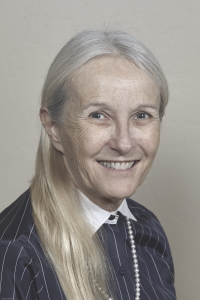Welcome, Barbara Ball, CG
-
Created on 24 June 2015
Earlier this month, BCG granted the designation of Certified Genealogist to Barbara Ball of Tucson, Arizona. SpringBoard invites readers to meet Barbara through this interview with editor Judy Kellar Fox, CG.
Who are you, Barbara?
Daughter of a psychologist and a Presbyterian minister, I was born in Montana and moved to Arizona as a toddler. I’m a Westerner. I was a tomboy, a motocross racer, and a bookish nerd. I played the flute, marched in the band, rode horses, and read every book I could get. I walked barefoot in the desert, loved the summer rains, and became a passionate nature and animal lover.
Barbara Ball, CG
As an adult, I’ve been a bookkeeper, medical transcriptionist, code writer, scientist, cartographer, genealogist, and lifetime student. I have three university degrees. I’m a wife, mother, and grandmother. I still play the flute, do needlework, sew, quilt, play bridge, garden, do jigsaw puzzles, draw, read, and swim.
Tell us about how your academic career has informed your genealogical work.
I was a GIS (geographic information systems) analyst, mapping endangered species habitat. I loved this work, which involved geographic location of plants and animals, analysis of historic maps, production of current maps, and spatial analysis of patterns found in migration and habitation. Maps are so crucial to genealogists, and I suppose I will always strive to find a niche in the world of genealogy that involves incorporating more geography and demographics into our work. Oh, I could write a book. Maybe I will.
You have already published an article about GIS for genealogists, right?
Yes, “Geographic Information Systems for Genealogists,” Association of Professional Genealogists Quarterly (APGQ) 32 (June 2014), 78–81. Another is forthcoming in the June 2015 issue of APGQ.
Why do you pursue genealogical research?
Originally it was a fun hobby when I lost my university job. After I completed the Boston University Online Certificate in Genealogical Research, I realized genealogy could be another career. Now I see it as I did my academic work—a field of research that is just beginning to develop into a potential academic discipline on its own merits. While I don’t know exactly how that might happen, I find it a fascinating possibility. The field is rigorous enough to satisfy my need for academic/scientific discipline, not only in the research process, but also in the logically supported approach to solving a problem or reaching a conclusion. The hypothesis-research-conclusions process appeals to me. The field is wide enough to encompass those who just want to click on the leaf as well as those who want to engage in intellectual stretching.
How did you prepare for certification?
Education. I went through the National Genealogical Society [NGS] American Genealogy: Home Study Course, then the Boston University course, then a ProGen Study Group. I’ve attended the Salt Lake Institute of Genealogy Advanced Evidence Practicum course every year it has been offered, and that has been extremely valuable.
About four months before my due date, I listened to a seminar by Judy Russell, J.D., CG, CGL, about writing the Kinship Determination Project [KDP]. She was adamant that you should never do a KDP without access to onsite research. I was so unhinged that I immediately scheduled a last-minute and rather expensive trip to Ohio, where I spent four days in the basement of a county courthouse that I had been in already twice before!
Who are your genealogical heroes?
My personal heroes would be Angela McGhie and Kimberly Powell. These two ladies are busy with their own work and their own lives, yet they always have time to offer support, encouragement, and a smile. They make the profession human. I can’t forget Harold Henderson, Michael Hait, and Melinde Lutz Byrne. Thank you.
Generically speaking, as a former academic, I have a great deal of respect for those genealogists who have retired from their academic careers and brought that rigorous discipline into the genealogy field.
What is your most satisfying genealogical work?
I love building up a picture of a family system. While producing the KDP required for my portfolio seemed akin to writing a master’s thesis, it was one of the most interesting things I’ve done. I love solving a riddle, but more satisfying is just the continual process of describing a family and how their dynamics resulted in a particular descendant, whether it be a family member of mine or a client.
What’s your most frustrating work?
I have two ancestors from Ireland that drive me batty. I also have a fellow named Ball that seemed to have dropped out of the sky. My most interesting brick wall involves the members of a very tangled family in England. I have letters from them in my archives, and a whole book of unlabeled photos that I’m sure would help me straighten them out!
How do you see yourself in five years, Barbara?
My husband’s retirement hobby is photography, so I see us taking many trips to areas where I can do research and he can wander around any nearby wildlife areas taking pictures. I would like to do more client work, and I really enjoy helping my friends with their family research. I hope to be able to move further into the professional realm of genealogy. I would like to do more mapping and spatial analysis projects, demonstrating the value of these tools, as well as writing articles that will be educational for other genealogists.
Congratulations on becoming a BCG associate, Barbara. Welcome!
Barbara Ball, CG, can be reached at and http://www.copestoneresources.com.
CG, Certified Genealogist, CGL, and Certified Genealogical Lecturer are service marks of the Board for Certification of Genealogists, used under license by Board-certified genealogists after periodic competency evaluation, and the board name is registered in the US Patent & Trademark Office.
